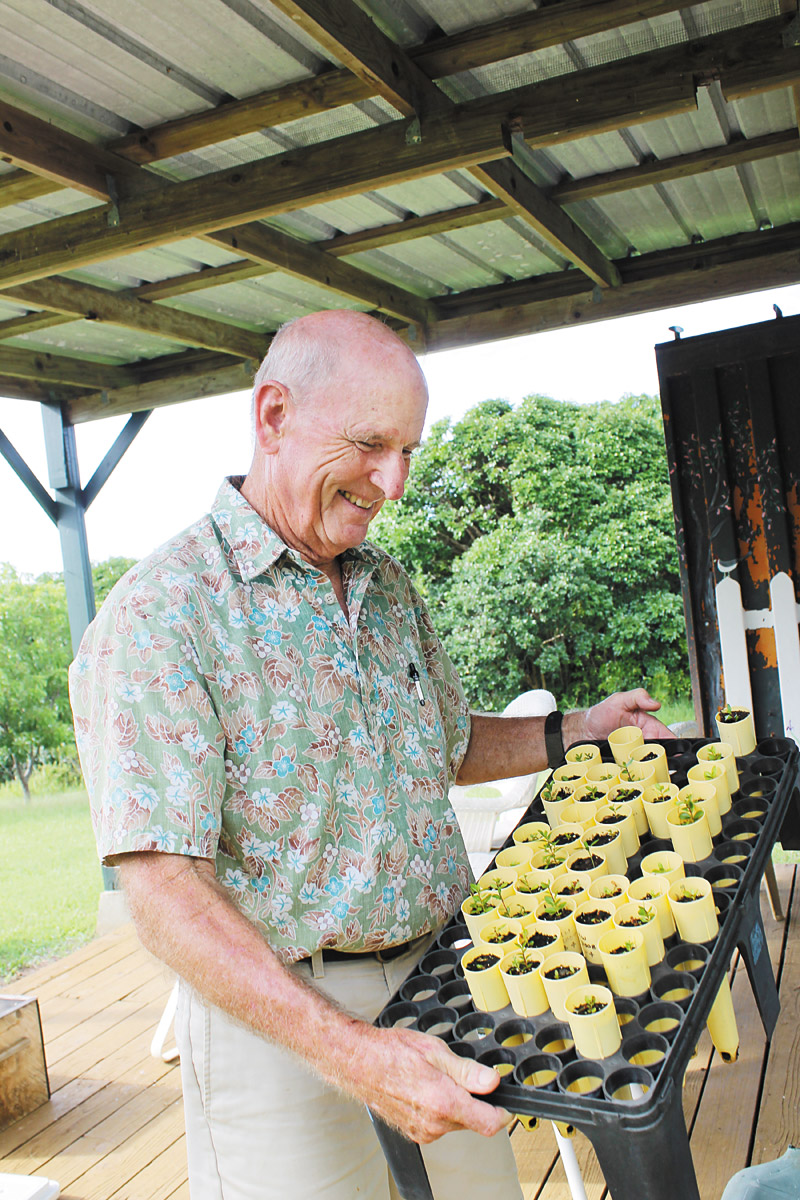Tree Hugger

Sandy Brodie in his nursery on the North Shore, where he is propagating many native species including koa and ohia
Alexander “Sandy” Brodie might be retired, but his days are busier than ever. When he’s not surfing at Hanalei Bay, he’s cultivating and conserving native species on his 10-acre tree farm or promoting his new book.
It’s no wonder he has such a great work ethic — his father was Oahu’s famed tire business tycoon Lex Brodie, a Kauai native who died in 2013 at the age of 98.
“Remember that ‘clank, clank, clank’ that you used to hear?” he asks, regarding the sound a cartoon caveman made while hammering a stone wheel from his dad’s well-known commercials. “That was me with a pipe wrench and a brick in the TV studio.”
Though his days of working for his dad in the tire business are long gone, he still takes what he learned from those experiences and puts it to good use.
“He was very disciplined,” he says about his father’s financial savvy, which helped him pen his book. “He was just a nut for going over the gasoline sales every day, and he’d make me sit down with him and explain it over and over again.” Brodie, a Kailua High School graduate, knows that children often don’t have someone like his dad to teach them how to be smart with money, so he decided to share his knowledge by penning a book for young adults, Common Cents Without Dollar Pain: First Guide for Teenagers and Young Adults to Money and Personal Business for a Lifetime, which he co-authored with a former U.S. Coast Guard Reserve colleague Timothy Wright.
- Sandy Brodie recently wrote a book for young adults about being financially savvy. Photo courtesy Sandy Brodie
- The Brodies take a walk around their koa tree farm to inspect the young plants for any kind of pests or diseases
- Koa tree farmers Lynn and Sandy Brodie
“The school system has taken out of the formula a lot of the kinds of things you need for everyday life. They think the parents should do it but, unfortunately, the parents missed it all too,” he explains.
The book contains plenty of helpful financial information that applies to all ages, from IRA investments to paying taxes.
“We take it all the way from when you’re old enough to read to when you’re signing your last will and testament,” he says.
Two gems of advice he offers readers are to pay bills as soon as they are received so they don’t “pile up somewhere,” and avoid the use of ATMs.
“Don’t get in the habit of just walking up and taking money out all the time,” he says. “It’s just too easy.”
It is straightforward advice, but the kind that everyone can use. Even his wife Lynn likes to read the book as a refresher course from time to time.
“I really like the way it’s put together. It’s just in a nice format, one thing right after the other, so it keeps it really simple and easy to find things,” she says.
As if compiling an educational book weren’t enough to keep him occupied in recent years, Brodie has been actively involved in creating a sustainable koa forest in his backyard since the late 1990s. During his first endeavor, Brodie planted nearly 1,000 koa trees, but about half of them succumbed to diseases, particularly koa wilt, which is caused by an introduced fungus.
“It was really disappointing,” he says about the species that once thrived across the islands from the coasts to the mountains prior to human arrival.
But it wasn’t until recently, after partnering with Hawaii Agricultural Research Center (HARC), that he planted a koa forest that looks more promising. The organization has been working on a project where some 20 koa families more resilient to the fungus were discovered. The seeds of these families were sent to Brodie in hope that they would eventually flourish on his property and begin to cross-pollinate, perpetuating a more resistant species. The father of three — Alex, Peter and Kimmee — planted some 350 seedlings that have only suffered about a 25 percent loss since July 2014.
“The best of the best will end up generating seeds,” says Brodie.
He’s an advocate for more planting projects across the Islands.
“What I’m looking at now is all this fallow land we have in the state from the old sugar plantations and everything else — there’s no reason it couldn’t be put into forestry,” says Brodie who graduated from the University of Washington with a Bachelor of Arts specializing in cartography and a minor in business administration. “We can turn out tons of oxygen every day, we can suck up carbon dioxide out of the atmosphere and we’d have an export crop, so it seems to me like a natural for the state to encourage forestry. There’s potential.”
It’s obvious how much work Brodie and his wife have put into their North Shore land, which originally was purchased by his father in the 1980s.
“When we first got here, this was all pasture with a few guavas on it,” says Brodie who moved to the island full time in 2002.
Now, the property is brimming with trees and wildlife.
“The bird population exploded,” says Brodie, whose career included marine construction and dredging, and building 26-foot fiberglass fishing boats on Oahu, as well as 28 years owning a motorcycle and power-equipment business.
“You walk through the forest on a moonlit night and it just kind of takes your breath away.”
To purchase Brodie’s book, visit amazon.com.
cocomidweek@gmail.com







